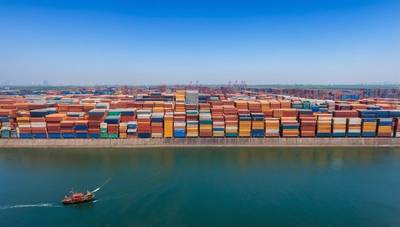Vietnam's surplus trade with the US will reach a record high by 2024
Data released by the U.S. on Wednesday revealed that Vietnam's surplus in trade with the U.S. reached a record-high last year. This could complicate Hanoi's attempts to avoid trade tariffs imposed by the Trump administration.
Analysts say Hanoi could be spared punitive measures if it pledges to increase its imports from the U.S. and takes other compensatory measures. The U.S. imposed sweeping tariffs on Chinese imports, which prompted an immediate reaction from Beijing. Trump also threatened to impose new duties on the EU. Mexico and Canada were given a 30-day suspension of 25% new duties on Tuesday, after promising to strengthen border protection. U.S. president Donald Trump hasn't made any comments about Vietnam since his election, but "he remains obsessed with trade imbalances", making the country an obvious target for tariffs. Deborah Elms is the head of trade policy at Hinrich Foundation in Asia. Vietnam's surplus in trade with the U.S. increased by almost 20% annually to a level of record exceeding $123 billion according to the most recent data from the U.S.
The gap with China increased by less than 6 percent to $295.4 Billion, which is far below the peak of 2018. The EU surplus grew by almost 13%, reaching a record high of $235.5 Billion. And the deficit with Mexico grew by 12 percent to $172 billion. This was also a new record. Vietnam and Mexico were major winners of the U.S.-China Trade War, when manufacturers in China relocated production to Mexico in order to avoid tariffs that Trump imposed in 2018.
CHIPS RISK
Sayaka Shiba is a senior analyst with the research firm BMI. She said that despite the growing trade gap, Vietnam does not appear to be a security threat for the U.S.
Shiba noted that the Trump administration has prepared tariffs against Mexico and China, citing immigration and drug risks, citing International Emergency Economic Powers Act. "It would be harder to argue convincingly" that Vietnam is a national security threat, Shiba said.
Shiba stated that Vietnam could still be subject to trade-related tariffs. He added that these measures would require investigations to support them, giving Vietnam the time it needs to find ways to avoid such measures. Shiba noted that sectoral tariffs could pose a greater risk to Vietnam, particularly on semiconductor imports. Vietnam is the top exporter of these products to the U.S.
Vietnamese officials have said repeatedly that they will seek to reach a compromise with Washington regarding trade. According to a government portal, earlier on Wednesday PM Pham Minh Chinh had instructed officials to prepare themselves for the effects of a potential global trade war. He did not mention the possibility of tariffs against Vietnam.
Shiba noted that among possible sweeteners, he suggested boosting Vietnam’s imports of liquefied gas from the U.S. and a reduction in import duties for U.S. agricultural goods, including soybeans, meat and cotton. He also said that exports are hard to reduce, as they come mainly from multinational companies operating out of Vietnam, like Samsung Electronics and Intel.
Elms stated that "promising to purchase things is the best approach for Vietnam even though tangible results may not be possible immediately."
(source: Reuters)











